Last Updated on by Catherine Tobsing
Stephanie M. needs to know:
Hi. I am building a new house with a bird room (for a 30+-year-old female Moluccan cockatoo) located in the middle of the house (where all the excitement happens).
It will have a drain and water for easy cleaning, plus doors for nighttime.
It will also have appropriate lighting.
I will need to install wet-protected light fixtures (easiest is typical shower recessed 6″ fixtures that take standard Edison base bulbs).
That’s my question…if the room is 10’2″W x 5’6″D x 8′ 4″H, how many lights do I need?
Thanks for any advice you can lend
Sounds like an exciting project Stephanie.
Pet bird lighting is one of my favorite subjects of all time.
So I have some good news and bad news.
To make this work you’ll need to rows of five fixtures each, separated by 2 feet in both the X and Y dimensions.
You can cut it back to eight lights if you’re unhappy with that design architecturally or finances are tight.
The bad news is ceiling fixtures reside typically at 8 feet.
There is a law of physics called the inverse square law of light.
It’s what the f-stops are based on in SLR cameras if you remember what those are.
Rather than turning this into a physics lesson simply look at the luminosity plunge for 20 inches from the light source. Read more about artificial lighting for pet birds.
The lights at ceiling height will be ineffective for your birds.
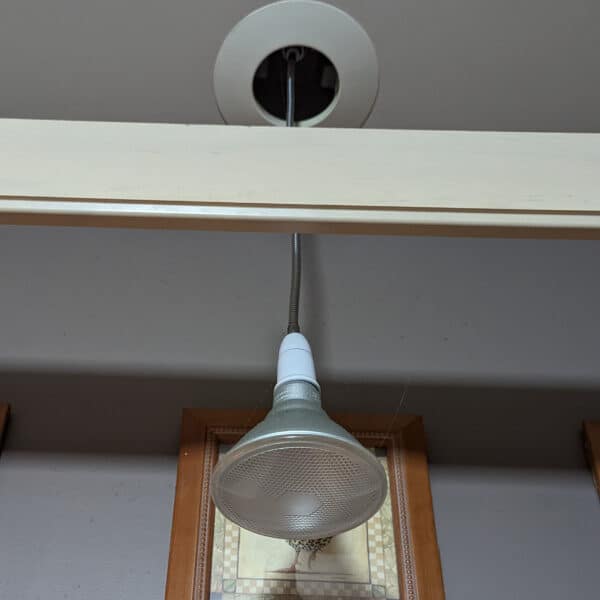
We used the 24-inch extension (10 bucks on Amazon) to lower the spotlight over the kitchen sink.
The countertop to recessed light distance is 7 feet.
Lowering the light 24 inches reduced the distance to the countertop by almost 30% increasing the luminosity by 90%.
Adding extenders to your recessed lights will provide your birds with exponentially increased lumens.
It would be best to add a timer in the wall switch setting it for 12 hours on and 12 hours off keeping your bird’s circadian rhythms in check.
We feel strongly although on scientifically feel that LED lighting stresses birds out.
There’s been one study done with budgies but we don’t feel it’s worth the chance.
it has to do with something called the Flicker Fusion Rate which you can read about here
We use CFL’s Which are slightly more energy-efficient and cooler (temperature-wise) than conventional incandescent lighting.
We have a video below where we tested several off-the-shelf floods and spots still reverted back to CFL spiral twists.
Not only do I love writing about lighting but I love installing it.
Here’s a pictorial guide and how we light cages for 10 birds in a two-story historic bungalow in Lowell Indiana.
Lighting for an African ringneck and a Quaker ~ video
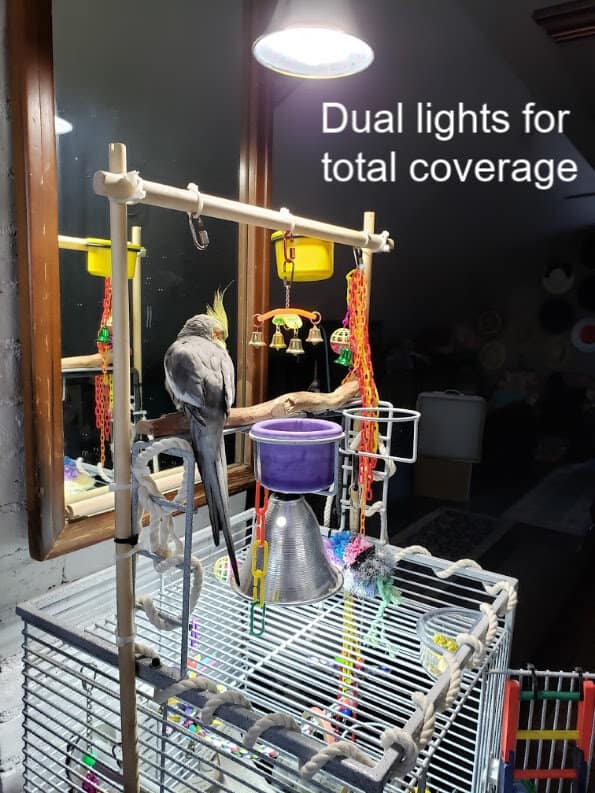
Play top birdcage lighting
Triple lighting over budgie aviary/birdcage
At the end of the day, there is no excuse not to light your bird’s daily environment.
Your birds enjoy it and you’ll appreciate the brightness in their feathers
Stay safe
Best
MitchR
Author Profile
Latest entries
 Feeding Exotic BirdsDecember 29, 2025How to Switch or Convert Your Bird From Seeds to Pellets: Real-Life Case Studies and Practical Guidance
Feeding Exotic BirdsDecember 29, 2025How to Switch or Convert Your Bird From Seeds to Pellets: Real-Life Case Studies and Practical Guidance Feeding Exotic BirdsDecember 16, 2025A Practical, Budget-Smart Guide to Feeding Birds Well
Feeding Exotic BirdsDecember 16, 2025A Practical, Budget-Smart Guide to Feeding Birds Well Bird EnviornmentsDecember 7, 2025Understanding Budgie Cage Bar Orientation: Myths, Realities & Practical Solutions for Vertical-Bar Bird Cages
Bird EnviornmentsDecember 7, 2025Understanding Budgie Cage Bar Orientation: Myths, Realities & Practical Solutions for Vertical-Bar Bird Cages Feeding Exotic BirdsDecember 5, 2025How Dr. T.J. Lafeber Rewrote the Future of Pet Bird Nutrition
Feeding Exotic BirdsDecember 5, 2025How Dr. T.J. Lafeber Rewrote the Future of Pet Bird Nutrition

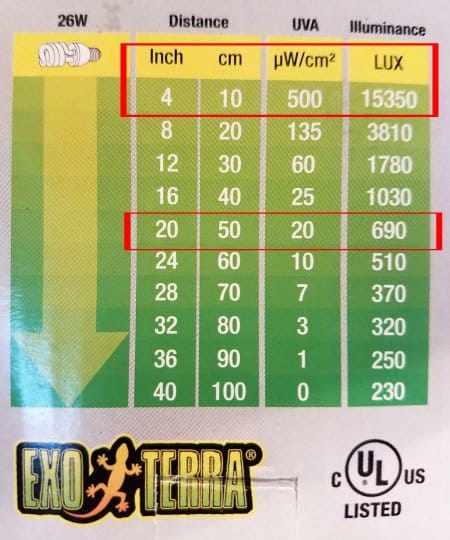
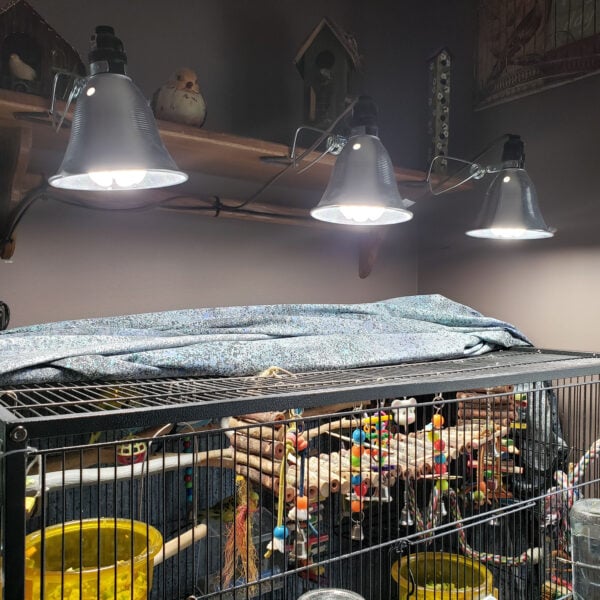
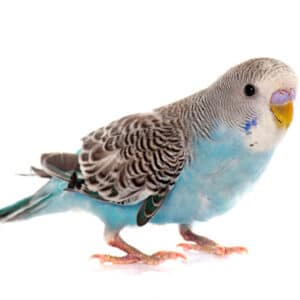
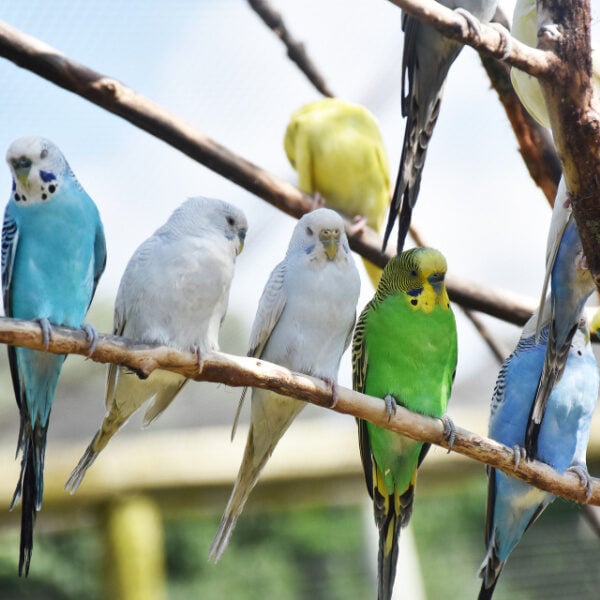
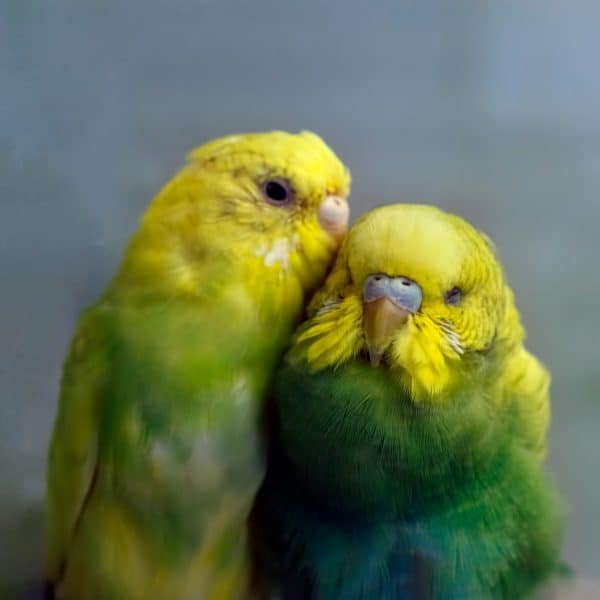
Steph_M
1 Oct 2020Hi Mitch,
Thanks so much for your detailed advice re: my bird room lighting. It’s all doable. I like your idea of the pendant light extensions, thanks…only trouble with this idea is that it will be a wet room, like a shower, so I need to use wet room fixtures.
I will strap a dropped ceiling above cage height + height for bird to sit on top of cage. How high above the cage do you suggest, so the bird would still be able to sit up there?
I’m also thinking of buying a new cage – right now she has an Animal Environments 45″W x 29″D x 71″H cage (I don’t think they are even in business anymore). I was looking at the choices on your site…do you have any favorites?
Thanks again for all of the time and advice you generously offer.
Best,
Steph